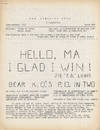
EXPOSITIO IN LIBROS POSTERIORUM ARISTOTELIS
by (INCUNABULA). PAULUS VENETUS
- Used
- Condition
- See description
- Seller
-
McMinnville, Oregon, United States
Payment Methods Accepted
About This Item
Venice: Guilelmus Anima Mia, Tridinensis, 11 August, 1486. 327 x 216 mm. (12 7/8 x 8 1/2"). Textually Complete. 116 (of 118) leaves, lacking initial and terminal blanks (two additional leaves tipped in at the back containing a manuscript table of contents in a late 15th or early 16th century hand). Double column, 70 lines of text in gothic type.
Original oak boards backed by modern white pigskin, raised bands, remnants of clasps. Lacking original pastedowns. In a marbled paper folding box backed with green morocco. Neat, brief contemporary marginalia by two hands in red and black, mostly confined to the first 50 leaves (one of these hands probably by the creator of the "Tabula" at the back); 19th century English ink ownership inscriptions by John W. Puricelle (or Duricelle) at front and back, the latter translating (with errors) the colophon and documenting the purchase of this volume in Paris on Quai des Augustins on 9 October 1869. Goff P-214; BMC V, 410; ESTC ip00214000. ◆Rear board with thin five-inch crack starting at head, opening leaf with shallow chip at fore edge, first gathering slightly thumbed, occasional minor foxing or ink smudges, otherwise an excellent copy, the binding scarcely worn, and the leaves generally clean and still crisp enough that they crackle when you turn them.
The first work independently printed by Anima Mia, this is an important commentary on Aristotle's "Posterior Analytics" by the leading logician of the Middle Ages. Scholastic philosopher Paul of Venice (1368-1428) was an Augustinian hermit and the period's foremost authority on Aristotle, producing seven expositions on the philosopher's works. Here, he discusses a portion of the great treatise "Organon" that examines how we demonstrate truth and define the nature of things using logic. The Latin text of Aristotle's work, translated by Jacobus de Venetia, is also included. This commentary was first printed by Venetian Theodorus de Reynsburch in 1477, and ours is the third of five incunabular editions (all printed in Venice) listed by Goff. Our printer identifies himself in the colophon as "Guiliermus de monteferrato tridinenses" (i.e., William of Trino, a municipality in the Duchy of Monferrato in the Italian Piedmont region). But he also called himself Anima Mia ("My Soul") and is identified that way by Goff and BMC. Active from 1485-99 and first noted by BMC as the partner of Antonello di Barasconi in 1485, he appears here for the first time under his sole imprint. He produced just over 30 works, mostly on his own, issuing texts in a variety of fields including theology, grammar, logic, scholasticism, the classics, and science intended for an unusually wide range of humanist and student readers. The original oak boards have held up over the centuries, and the lack of trimming to the marginal annotations confirms that the wide margins have not been disturbed. All editions of this work are rare in the marketplace: until a copy sold for a hammer price of £8,500 ($11,847) in 2021, none had appeared at auction since 1984..
Original oak boards backed by modern white pigskin, raised bands, remnants of clasps. Lacking original pastedowns. In a marbled paper folding box backed with green morocco. Neat, brief contemporary marginalia by two hands in red and black, mostly confined to the first 50 leaves (one of these hands probably by the creator of the "Tabula" at the back); 19th century English ink ownership inscriptions by John W. Puricelle (or Duricelle) at front and back, the latter translating (with errors) the colophon and documenting the purchase of this volume in Paris on Quai des Augustins on 9 October 1869. Goff P-214; BMC V, 410; ESTC ip00214000. ◆Rear board with thin five-inch crack starting at head, opening leaf with shallow chip at fore edge, first gathering slightly thumbed, occasional minor foxing or ink smudges, otherwise an excellent copy, the binding scarcely worn, and the leaves generally clean and still crisp enough that they crackle when you turn them.
The first work independently printed by Anima Mia, this is an important commentary on Aristotle's "Posterior Analytics" by the leading logician of the Middle Ages. Scholastic philosopher Paul of Venice (1368-1428) was an Augustinian hermit and the period's foremost authority on Aristotle, producing seven expositions on the philosopher's works. Here, he discusses a portion of the great treatise "Organon" that examines how we demonstrate truth and define the nature of things using logic. The Latin text of Aristotle's work, translated by Jacobus de Venetia, is also included. This commentary was first printed by Venetian Theodorus de Reynsburch in 1477, and ours is the third of five incunabular editions (all printed in Venice) listed by Goff. Our printer identifies himself in the colophon as "Guiliermus de monteferrato tridinenses" (i.e., William of Trino, a municipality in the Duchy of Monferrato in the Italian Piedmont region). But he also called himself Anima Mia ("My Soul") and is identified that way by Goff and BMC. Active from 1485-99 and first noted by BMC as the partner of Antonello di Barasconi in 1485, he appears here for the first time under his sole imprint. He produced just over 30 works, mostly on his own, issuing texts in a variety of fields including theology, grammar, logic, scholasticism, the classics, and science intended for an unusually wide range of humanist and student readers. The original oak boards have held up over the centuries, and the lack of trimming to the marginal annotations confirms that the wide margins have not been disturbed. All editions of this work are rare in the marketplace: until a copy sold for a hammer price of £8,500 ($11,847) in 2021, none had appeared at auction since 1984..
Reviews
(Log in or Create an Account first!)
Details
- Bookseller
- Phillip J. Pirages Fine Books and Medieval Manuscripts
(US)
- Bookseller's Inventory #
- ST12263
- Title
- EXPOSITIO IN LIBROS POSTERIORUM ARISTOTELIS
- Author
- (INCUNABULA). PAULUS VENETUS
- Book Condition
- Used
- Quantity Available
- 1
- Publisher
- Guilelmus Anima Mia, Tridinensis, 11 August
- Place of Publication
- Venice
- Date Published
- 1486
- Keywords
- Philosophy
Terms of Sale
Phillip J. Pirages Fine Books and Medieval Manuscripts
30 day return guarantee, with full refund including shipping costs for up to 30 days after delivery if an item arrives misdescribed or damaged.
- Does the default shipping charge seem high? If so, please contact us by email at info@pirages.com for a shipping charge tailored to your order and location. You may also call us at (800) 962-6666 in the US or (503) 472-0476 outside the US, Monday through Friday between the hours of 10 am and 4 pm US Pacific time or leave us a message.
- For all orders outside the US and Canada, please contact us for shipping charges before completing your order.
- If you complete your order before you receive a shipping quote, we will need to contact you to get additional funding to cover the cost of shipping before we can ship your items.
- Except in the cases of items priced at $100 or less (for which we charge a small handling fee), we wish only to pass along actual carrier charges to our customers. The constraints of this website force us to assume that each purchase is both heavier and further away than average, so we would be pleased to adjust the charges to reflect actual weights and locations.
About the Seller
Phillip J. Pirages Fine Books and Medieval Manuscripts
Biblio member since 2006
McMinnville, Oregon
About Phillip J. Pirages Fine Books and Medieval Manuscripts
Phillip J. Pirages Fine Books an Manuscripts was established in 1978 on a ping pong table in a basement in Kalamazoo, Michigan. From the beginning, its founder was willing to sell a range of material, but over the years, the business has gravitated toward historical artifacts that are physically attractive in some way--illuminated material, fine bindings, books printed on vellum, fore-edge paintings, beautiful typography and paper, impressive illustration. Today, the company still sells a wide range of things, from (scruffy) ninth century leaves to biblical material from all periods to Wing and STC imprints to modern private press books to artists' bindings. While we are forgiving about condition when something is of considerable rarity, we always try to obtain the most attractive copies possible of whatever we offer for sale.
Glossary
Some terminology that may be used in this description includes:
- Marbled Paper
- Decorative colored paper that imitates marble with a veined, mottled, or swirling pattern. Commonly used as the end papers or...
- Tipped In
- Tipped In is used to describe something which has been glued into a book. Tipped-in items can include photos, book plates,...
- Marginalia
- Marginalia, in brief, are notes written in the margins, or beside the text of a book by a previous owner. This is very...
- Crisp
- A term often used to indicate a book's new-like condition. Indicates that the hinges are not loosened. A book described as crisp...
- Morocco
- Morocco is a style of leather book binding that is usually made with goatskin, as it is durable and easy to dye. (see also...
- Leaves
- Very generally, "leaves" refers to the pages of a book, as in the common phrase, "loose-leaf pages." A leaf is a single sheet...
- Colophon
- The colophon contains information about a book's publisher, the typesetting, printer, and possibly even includes a printer's...
- Fore Edge
- The portion of a book that is opposite the spine. That part of a book which faces the wall when shelved in a traditional...
- Raised Band(s)
- Raised bands refer to the ridges that protrude slightly from the spine on leather bound books. The bands are created in the...




